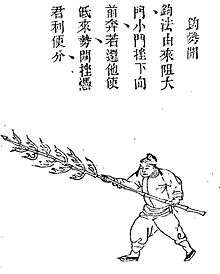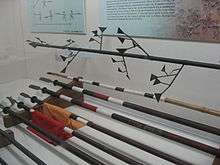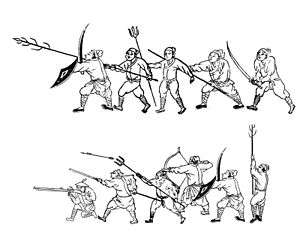Langxian
The langxian was a branched, multi-tipped spear with blades attached to the branches. The blades could be dipped in poison. The langxian was a weapon well suited for defense, as it would be difficult for an opponent to assault the wielder without risking contact with the blades.
| Langxian | |||||||
|---|---|---|---|---|---|---|---|
 The langxian depicted in the Wubei Zhi | |||||||
| Chinese name | |||||||
| Chinese | 狼筅 | ||||||
| Literal meaning | wolf brush | ||||||
| |||||||
| Korean name | |||||||
| Hangul | 낭선 | ||||||
| |||||||
It was probably an invention of the Chinese general Qi Jiguang of the Ming Dynasty, who described it in his manual titled Jixiao Xinshu. The manual describes that the langxian acted as backup for the rattan shield bearers in a "mandarin duck formation". In Korea, the weapon, known as nangseon, was mentioned as early as the 16th century martial arts manual Muyejebo, which was based on the Jixiao Xinshu.

Langxian (top), on display

Langxian being used in the mandarin duck formation
This article is issued from Wikipedia. The text is licensed under Creative Commons - Attribution - Sharealike. Additional terms may apply for the media files.